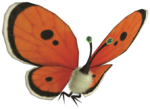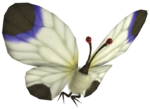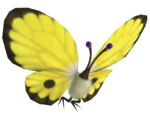Flutterbie family: Difference between revisions
(Updated the naming scheme to use "Spectralids".) |
(→Naming) |
||
| Line 34: | Line 34: | ||
To note is that, similarly to the Unmarked Spectralids, every time the creatures are referred to in singular, "Spectralids" is used as opposed to "Spectralid" – unlike {{p2}}, there are sentences that explicitly use the singular form. The [[Electric Spectralid]] is the only creature to break this mold. | To note is that, similarly to the Unmarked Spectralids, every time the creatures are referred to in singular, "Spectralids" is used as opposed to "Spectralid" – unlike {{p2}}, there are sentences that explicitly use the singular form. The [[Electric Spectralid]] is the only creature to break this mold. | ||
Two genera names are used in this family: ''Fenestari'' for [[White Spectralids]], and [[Yellow Spectralids]], and ''Fenestrati'' for [[Red Spectralids]]. Both refer to the Latin word ''fenestra'', meaning "window". | Two genera names are used in this family: ''Fenestari'' for [[White Spectralids]], and [[Yellow Spectralids]], and ''Fenestrati'' for [[Red Spectralids]]. Both refer to the Latin word ''fenestra'', meaning "window". ''Fenestari'' is genus shared by other Spectralids. This is a [[mistake]], as members of the same genus cannot be in separate families in real-world taxonomy. | ||
==See also== | ==See also== | ||
Revision as of 09:01, November 19, 2020
The flutterbie family is a family of enemies in Pikmin 3 and Hey! Pikmin. It consists of small butterfly-like insects that pose no threat to Pikmin or leaders. They merely flutter about, occasionally landing, and aren't worth many seeds or Pokos, but some of them can drop valuable rewards after death: nectar or a spray drop. Their color indicates what they might drop, if anything. In Hey! Pikmin, they can't be interacted with and are not logged, appearing only in cutscenes.
This family consists of two genera: Fenestari for White Spectralids, and Yellow Spectralids, and Fenestrati for Red Spectralids.
Members
Red Spectralids
- Main article: Red Spectralids.
The Red Spectralids appears in the Garden of Hope and a few Mission Mode stages. Upon defeat, it releases a drop of ultra-spicy spray.
White Spectralids
- Main article: White Spectralids.
White Spectralids are of a color introduced in Pikmin 3. Unlike the remaining Spectralids, these drop no special rewards when defeated, and seeing as they're only worth one Pikmin seed, they're usually more trouble than they are worth. Nevertheless, they appear near the landing site or an Onion, making them useful if the player wants to help grow an army with minimal exploration. In Hey! Pikmin, it only appears once, with some Pikmin chasing it as it flies, until it lands on a stone. After they lunge at it, it flies off.
Yellow Spectralids
- Main article: Yellow Spectralids.
Yellow Spectralids appear more commonly than Red Spectralids, and upon defeat, they release a drop of nectar. In Hey! Pikmin, it is found just flying forward, as Pikmin chase it. Eventually it flies off screen.
Naming
- See also: Flitterbie family#Naming.
The family's name is a play on a letter swap of the word "butterfly" ("flutterby") – "flutter" meaning "to flap rapidly". Many of the names used for these creatures are similar to the ones used by the Unmarked Spectralids; see here for details.
To note is that, similarly to the Unmarked Spectralids, every time the creatures are referred to in singular, "Spectralids" is used as opposed to "Spectralid" – unlike Pikmin 2, there are sentences that explicitly use the singular form. The Electric Spectralid is the only creature to break this mold.
Two genera names are used in this family: Fenestari for White Spectralids, and Yellow Spectralids, and Fenestrati for Red Spectralids. Both refer to the Latin word fenestra, meaning "window". Fenestari is genus shared by other Spectralids. This is a mistake, as members of the same genus cannot be in separate families in real-world taxonomy.


